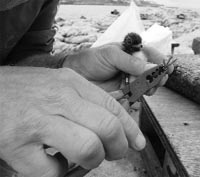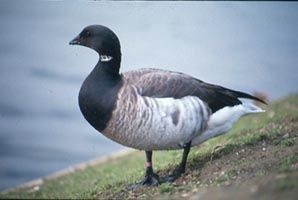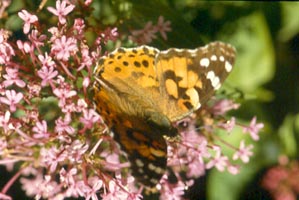TERNS
IN DALKEY
In July a neighbour was expecting some American friends who had been on a
cycling tour of Ireland. Unfortunately their holiday coincided with torrential
rain, floods and cool winds all under a grey sunless sky. Before they even
got to Dublin they had given up, worn down by the damp and gloom and booked
a flight to the South of France. Holidaying in Ireland in the summer can
be a gamble but Ireland in the winter attracts hundreds of thousands of visitors
who are quite happy to stay here for six months or more. Not a terribly wise
move you might think but then these visitors are coming here to escape days
of almost continuous darkness, ice and snow in the far north and cold weather
and lack of food availability in the east. These visitors are birds; waders,
ducks, swans, geese, thrushes and finches. If you’d like to find out
a little more about the birds that flock to Ireland in the Winter there’s
a free illustrated talk about them in the Kingston Hotel on the 2nd September.
Organised by the South Dublin Branch of BirdWatch Ireland the talk is free
and open to everyone. It is aimed at people who are interested in wildlife
and would like to know a lot more about it. We’ll be talking about
and giving identification tips on the many different species of birds including
waders, geese, ducks and all the birds that might turn up on fields and parks
near you and even in your garden. We’ll be explaining why some of these
birds travel thousands of miles to get to our shores and lakes and what keeps
them here over the winter months. We’ll also have a question and answer
session afterwards so if there’s anything you want to know about birds
we hope we’ll be able to answer your queries. We’ll have a little
shop at the meeting as well at which we’ll be selling bird food, bird
identification guides and CDs. We have meetings at the Kingston every month
from September to May with a talk about birds or some wildlife-related subject
and each meeting is followed by a guided outing or coach trip to see birds.
Our September outing is to Kilcoole (the village formerly known as ‘Glenroe’)
in Co. Wicklow. We’ll be walking down the coast with the sea on one
side and the BirdWatch Ireland reserve and open fields and farmland inland.
In September a lot of birds will have came down from their breeding grounds
in the far north and will be stopping over at sites such as this. There will
also be swallows and house martins that might be feeding up before setting
off across the sea to begin their journey to Africa. The photograph shows
a Roseate Tern chick which was
born in June in a nestbox on Maidens Rock off Dalkey Island. It is being
weighed and having a ring, or band, put on its leg to act as a record in
case the bird is recovered somewhere else, such as near its wintering ground
off West Africa. Through leg rings on birds it can be established where and
when they were born and where they have flown from. Through leg rings it
has
been found that Roseates can live up to 17 years. They are one of Europe’s
most endangered breeding seabirds, so Dalkey is privileged to have at least
one pair breeding. The rings are put on very carefully and don’t cause
any distress to the birds. Bird ringers have to have a licence which they
get after doing hundreds of supervised ringings. Although only one pair of
Roseates bred on Maidens Rock there were also Common and Roseate terns breeding
on it, though once again subject to the treacherous weather of an Irish summer.

|



